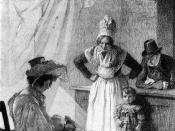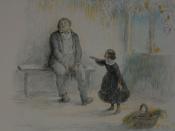Flaubert and Dickens both fall into the categories of Realist writing and social analysis and criticism. Both were preoccupied with demonstrating the classed-based nature of the society of their respective times and places in history. Both Pip and Emma Bovary spend their time seeking to change their status in society, and the two extracts lay bare the difficulties with which they are presented. Whilst Emma tries her hardest to seem at ease with the elevated company with which she finds herself because of her new husband's position, Pip struggles to understand the changing (and unchanging) attitudes of those around him following the news of his imminent legacy.
In the scene from Flaubert's Madame Bovary, Emma and Charles Bovary, having recently returned from their honeymoon, are attending a party at which their presence is tolerated rather than celebrated - owing to Charles' profession as a simple county doctor. Emma, however, is utterly taken by what she sees as the high society all around her.
Flaubert draws attention to moments where Emma is out of her depth socially - the conversation "full of words she did not understand", her light-headed response to the dance with the Viscount. Even her inability to waltz highlights one simple fact: Emma cannot instantly intergrate herself into such company, try as she might.
The author reminds Emma - and the reader - of her humble beginnings by describing her visualization of, "herself again as formerly, skimming with her finger the cream off the milk-pans in the dairy." Emma feels that her old life is now so far away that "she almost doubted having lived it." However, the implication of Emma's reminiscence is that a part of her will always be the girl on the farm, however far up the social ladder she succeeds in climbing. It...


